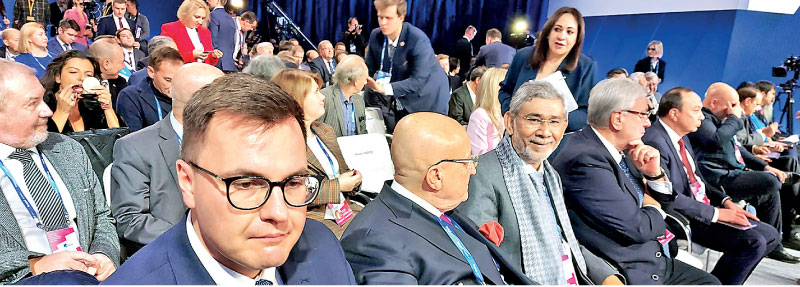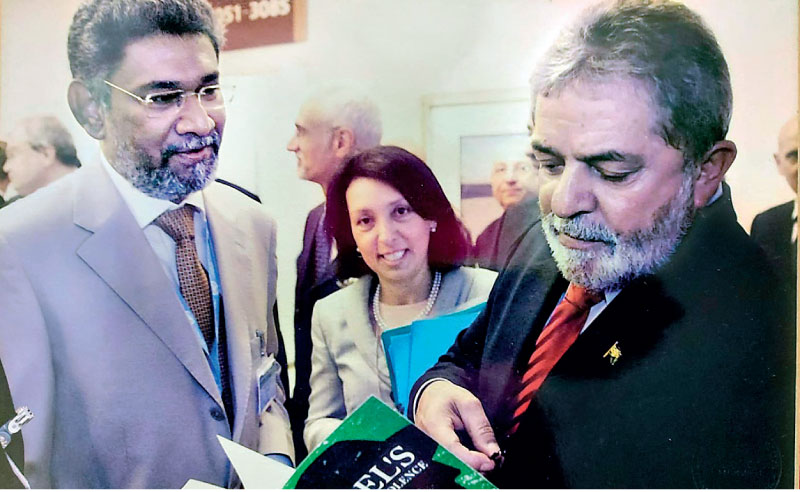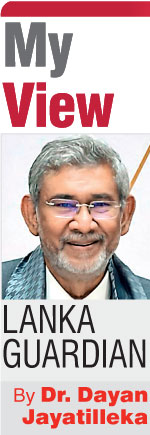Saturday Feb 21, 2026
Saturday Feb 21, 2026
Thursday, 3 November 2022 01:46 - - {{hitsCtrl.values.hits}}

Panel of experts

Front row at Plenary

With Lula 2009
|
 The elder statesman, the Nelson Mandela of the global South’s Left, Lula returns to the world scene – also through BRICS – when humanity is in crisis and the world order in tumultuous transition. He will infuse a measure of hope and reason.
The elder statesman, the Nelson Mandela of the global South’s Left, Lula returns to the world scene – also through BRICS – when humanity is in crisis and the world order in tumultuous transition. He will infuse a measure of hope and reason.
A positive planetary impact is his strongly environmentalist stance on the Amazon, one of the green lungs of the globe, a stance the exact opposite of outgoing right-wing President Bolsonaro who permitted privatisation of the forest and logging by corporates, causing murders, forest fires and the blowback of a (Jesuit-driven) synod on the Amazon by Pope Francis. Catholics voted for Lula; Evangelicals backed Bolsonaro.
Latin America’s politics in the 21st century has been dubbed ‘Fifty Shades of Pink’. The continent recently experienced a cascade of left-wing leaders elected in Brazil, Colombia, Mexico, Argentina, Chile and Peru. Newsweek locates Lula’s victory within “a shift back to the Left now common in major Latin American economies”.
Pink Tides 1.0 and 2.0 prove that for any real progressive to lead a country, it is vastly better to have a nationally, directly elected presidency than merely a parliamentary democracy, because (a) republican popular sovereignty is expressed through the franchise in a more direct, less parochial and fragmented manner and (b) in most societies the majority consists of the economically hard-pressed, not the well-to-do.
With Fidel gone, Lula is the father figure of Latin America’s left. Vincent Bevins reported in the New York Review of Books that Lula kicked off his presidential comeback campaign in January 2022 outside a screening of the movie Marighella, together with its cast.
The film is about Carlos Marighella, dissident Communist leader from Sao Paulo and pioneering urban guerrilla, whose struggle against the military dictatorship of 1964 and subsequent martyrdom sowed the seeds of the spirit of resistance of which Lula’s Workers Party was the democratic harvest.
I was presenting a paper on the Nicaraguan Revolution at the Pugwash Conference in 1985 in Sao Paulo when Lula and his Workers Party (PT) were consolidating as giant factors in his vast industrial home base. I met Lula in Geneva 2009 during his first presidency, and presented him a signed copy of my book on Fidel.
Moscow mood
All eyes are currently on Moscow and Putin. I was privileged to pose a question to him in a face-to-face forum. This column was rested last week because I was back briefly in Moscow with my wife Sanja, for the annual Valdai Forum to which we had been invited as participants, with me as a speaker on the last panel which preceded the plenary addressed by President Putin.
The Independent (UK) of 28 October has described the Valdai Forum as “a conference of international policy experts” organised by the Valdai Discussion Club “a think-tank based in Moscow with close links to the Russian President… Since it was founded in 2004, Putin has met with its participants each year…”.
In actuality, the Valdai Discussion Club is not a standard think-tank; it is a think-tank of think-tanks, a consortium of the top foreign and strategic/security policy institutes in Russia.
There were 111 participants from 41 countries. Two of the participants (remotely, on giant screens) in the free-wheeling discussions were iconic US scholar-intellectuals, Prof .Robert Legvold and Prof. Jeffrey Sachs. Legvold is Marshall D. Shulman Professor Emeritus in the Department of Political Science at Columbia University, while Jeff Sachs is Director of the Centre for Sustainable Development at Columbia University. Russia’s isolation is fiction. The dozens of countries that have refused to go along with condemnation of Russia, not to mention sanctions, include big powers, pivotal states/regional influentials, cumulatively containing the majority of humanity: China, India, Brazil, Pakistan, Egypt, Turkey, Iran, Saudi Arabia, Indonesia, South Africa, Vietnam, Algeria. Russia retains the friendship and economic interface with the crucial middle tier of the world system.
The West’s 13,000 sanctions have failed to dent, still less derail Russia’s economy. Snapping ties with Russia and the financial haemorrhage on military equipment for the Ukraine have blown back on the West while simultaneously serving as a stimulant for new bilateral and multilateral arrangements among rising economic powers which is opening up spaces, reconfiguring the map of the world economy.
Delegates from Brazil through South Africa to Indonesia were talking of the needle of influence flickering from the G-7 to the G-20 which will meet in Jakarta next month. Most heartening was the ubiquity of the phrase “the New Non-alignment”.
|
A question to Putin
President Putin spoke for an hour, with bristling energy, engaged, leaning into it. He adverted to a ‘revolution’ in the world order, citing Lenin’s famous conditions defining a revolutionary situation (without naming Lenin however, and simply adding “as the classics tell us”, with a mischievous glint and half-smile).
The Forum’s organisers had generously assigned me a seat in the front row, placed between two pillars of Russia’s foreign and strategic policy intelligentsia: National Research University Higher School of Economics, School of International Economics and Foreign Affairs Dean Sergei Karaganov and Ministry of Foreign Affairs Moscow State Institute of International Relations (MGIMO) Rector Anatoly Torkunov.
Here are my question and Putin’s serious, substantive and considered answer:
Dayan Jayatilleka: Mr. President, it is said that Russia is now facing a proxy war waged by the collective West and NATO. If so, it is probably the most serious threat faced by Russia since 1941. At that time, during the Great Patriotic War, the Soviet leader who was a Communist reached out to the Orthodox church and to Russian nationalism in order to form a broad front to defend Russia.
Would you say that in a similar spirit, you would revisit the Soviet Russian past, the Communist heritage from 1917 to extract any useful elements of it, including the history of the Red Army, and would you think it worthwhile to reach out to the Communist elements however few they are in Russia to join in a broad patriotic front?
Vladimir Putin: My position consists in the following. I believe we have to take advantage of all of our historical heritage. I believe we should not renounce anything. I believe we should not turn away from the positive elements we used to have in the Russian empire, there was a lot of positives in the USSR, advantages and disadvantages, problems and issues that were overcome in different fashion, they had different consequences.
As far as our relationship with the left part of the political spectrum is concerned as well as other political movements, I can tell you that the special nature of the current Russian society, we have a consensus as far as Russian foreign policy is concerned.
We have pro-Western elements whose families live there, whose children study there. It’s a very small component and every country has such as element. But mostly our society enjoys a consensus. There is a great level of consolidation regardless of their political hue, regardless of how they view the path Russia should take in its development.
Communists believe that everything should be nationalised, once again that we should return the State into the economy — well, how efficient that’s going to be is hard to tell. To an extent at a certain stage in history that probably might happen, we have a law on nationalisation but we are not resorting to it because there’s no need for that.
We assume that we need to use the most efficient tools for our country’s development, mainly the principles of the market but under the guidance of the authorities and the citizens. We need to use these advantages to achieve some goals as the greater wellbeing for the country, eradication of poverty, taking efforts to build more and better, achieve better healthcare and education and address other important issues we are facing.
That is why we are working and engaging with those who hold left-wing views including communist convictions. We have respect for them. As you have aptly said, the Soviet Union was controlled by the Communist Party for a very long time. I’m not going into detail what was good and what was bad.
You also mentioned religious organisations. We have four traditional religions in Russia. All of them are vastly patriotic. As far as the Russian Orthodox church is concerned, throughout all of Russian history it’s been together with its faithful, its believers and its people and the current stage is no exception. We have some characteristics, special characteristics.
But right now, with regard to our religions we are not interfering in the internal life of our religions. We probably give them vaster freedoms than some countries which deem themselves to be democratic ones. We believe that we owe our religions a great debt because during the Soviet times their property was taken away from them, so sometimes they dealt a heavy blow to religious organisations and in particular to the Russian Orthodox church.
That is why we are trying to support all of our religious groups without however interfering in their internal affairs. I think it had never happened before. On the one hand we sense this general patriotic sentiment. People are patriotic, they want our country to be stronger, our interests abroad be protected, at the same time we provide full freedom to all these organisations. This situation, I think, yields the results we seek.
(For the live close-up of my question and his reply (six-and-a-half minutes), please watch from 1:35:20 to 1:41:47 of the complete video of the Putin session: Plenary Session of the 19th Annual Meeting of the Valdai Discussion Club — Valdai Club)
Question-time ran for three-and-a-half hours. When Russia in Global Affairs (Moscow’s answer to Washington’s Foreign Affairs) Editor-In Chief Prof. Fyodor Lukyanov and leading light of the Valdai Club, who is also the moderator for President Putin’s annual discussion, strove to bring the Q&A to a close after three hours, Putin gleefully stayed engaged, pointing out everyone in the room with their hands up, wise-cracking and answering every question squarely.
Which values?
The atmosphere of open dialogue and debate at the Valdai Forum, reflecting the self-confidence of the Russian policy elite, is evidenced by the pointed critique I could make of the influential Russian conservative philosophical discourse:
“I’d like to point out what looks like a fundamental contradiction in what we have been saying here. Yesterday, one of the speakers presented, quite rightly I believe, the idea of a Eurasian modernity, and the history of Russia especially during the Soviet period shows that it was the vanguard of an alternative modernity.
“Today that alternative modernity can very well be a polycentric, multipolar Eurasian modernity. But there is a contradiction between any notion of a Eurasian modernity and on the other hand a paradigm which is purely traditionalist, exclusively civilisational, culturalist and anti-modern.
“Now everything that was said about the civilisational approach, and the different ‘spirits’ of Russia, China, India, Turkey may all be very valid but would have very little resonance outside the ethno-civilisational borders. If one is to compete with the collective West, then you need a message which is rooted in your own culture and civilisation but is also universalist, which also has a universalist and humanist aspect. And that contradiction has to be addressed.
“The West says it stands for change in societies, but it is opposed to change in the world system. The East cannot say that it is for changes in the world system but is opposed to changes within societies, especially if we say that the old order has caused injustice and inequality. There is bound to be rebellion, resistance on the part of the ‘Narod’, the people. We must never forget the people, especially the youth.
“So, my question… is whether the answer does not lie in the formula, and the application of the formula, presented by [Academician and Foreign Minister] Yevgeny Primakov who spoke about a multi-vector policy?
“Of course, he was talking about foreign policy, but in terms of ideas, in terms of ideologies, is not a multi-vector project which looks to and incorporates modernity and traditionalism, forward-looking and looking back, North and South, a better option for us?”
(From 1:24:30 to 1:27:22, Values in the Modern World. What Is Their Balance for Genuine Equality? Sixth Session of the 19th Annual Meeting of the Valdai Discussion Club — Valdai Club)
|
Ukraine conflict and world order
The Russian policy-elite is completely unintimidated by the West and unfazed by Ukrainian ‘tactical breakthroughs’ as they put it. The Russians are far from gung-ho, but reveal an unruffled resoluteness, stemming from the sheer vastness of their country, the depth of their civilisation and culture and the pattern of their military history.
They are ready to fight for years. Russian military history has been one of setbacks, recovery and counteroffensives. The Asian experts (including a retired Major-General) told me that while Russia may not win the war, it certainly will not lose the war and it is Ukraine and the collective West that are likely to be more vulnerable to attrition.
From Putin down the line, the Russian policy-elite sees itself as the reluctant but determined and destined vanguard of the global struggle for a ‘post-hegemonic’ multipolar world order; ‘a world without superpowers’ as the annual report of the Valdai Club puts it. Russia sees this as an inexorable dynamic process.
My own presentation was as a member of the ‘expert panel’ in the thematic session ‘The World That Crumbled: Lessons for the Future From the 2022 Military-Political Crisis’.
The Valdai Club’s website described this segment as follows: “One thematic session was held on the last day of the 19th annual meeting of the Valdai Discussion Club, during which the Club’s experts tried to formulate what lessons the military-political crisis of 2022 presents for the future. The conference ended with a plenary session, in which Russian President Vladimir Putin participated.”
(The World Crumbles: What’s Next? Fourth Day of the Annual Meeting of the Valdai Discussion Club — Valdai Club)
For my part I argued against teleology, asserting that a multipolar world order, though desirable and imperative in the global South’s striving for ‘world equilibrium’ (Simon Bolivar, Jose Marti), was a tendency or collection of tendencies, but was not an inevitable evolution, still less a preordained direction.
The bottom-line of my perspective was as follows; which will prevail—the unipolar hegemonic project or the multipolar counter-hegemonic project—will be decided by ‘who will prevail over whom’ (Lenin) on the Ukrainian frontline of a century-long Cold War turned hot.
This year of inflection is also a year of reflection. By its policy of unprecedented economic and cultural sanctions, the West has not isolated Russia, it has just forced Russia back on its own vast resources, while also making it the engine of the search by the ‘world’s majority’ (Sergei Karaganov’s term) to weave alternative economic and conceptual (i.e., cognitive) patterns.